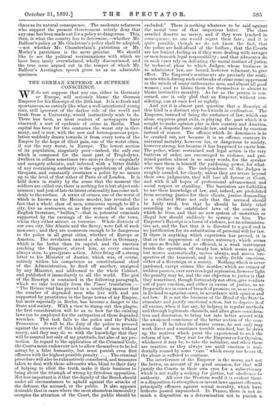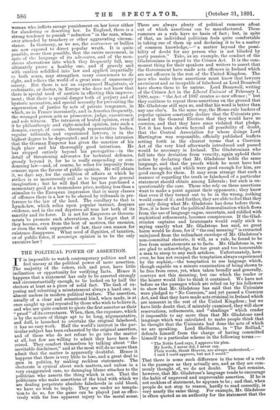THE GERMAN EMPEROR AS SUPREME CONSCIENCE.
WE do not suppose that any one, either in Germany or Europe, will seriously blame the German Emperor for his Rescript of the 26th inst. It is so fresh and spontaneous, so entirely like what a well-intentioned young man, still ignorant of the darker side of the world and fresh from a University, would instinctively wish to do. There has been, as most readers of newspapers have observed, a sort of epidemic of crime in Berlin. That capital has been for two centuries the worst city in Ger- many, and is now, with the new and heterogeneous popu- lation suddenly drawn towards it from every town of the Empire by the hope of illicit gain, one of the worst cities, if not the very worst, in Europe. The lowest section of its population, singularly poor—indeed, the only one which is composed for the most part of Troglodytes, dwellers in cellars sometimes two storeys deep—singularly and savagely atheistic, and infected with a bitter dislike of any restraining authority, is the opprobrium of philan- thropists, and constantly overtaxes a police by no means up to the level of that either of Paris or of London. It is held down in reality by the sense that the moment the soldiers are called out, there is nothing for it but abject sub- mission ; and just of late its latent criminality has come sud- denly to the surface. A series of crimes, one of the worst of which is known as the Heinze murder, has revealed the fact that a whole class of men, numerous enough to fill a city, live as souteneurs, or, as they were called in earlier English literature, "bullies,"—that is, potential criminals supported by the earnings of the women of the town, whom they either attract or terrorise. Whole districts of our own city, like Alsatia and the Savoy, were full of such men once ; and they are numerous enough to be dangerous to the police in all great cities, whether of Europe or America. The revelation caused a shudder in Germany, which is far better than its capital, and the emotion reaching the Emperor, stirred him, as every emotion always stirs, to precipitate action. After firing off a strong letter to his Minister of Justice, which was, of course, entirely within his competence as constitutional chief of the Administration, he fired off another, unsigned by any Minister, and addressed to the whole Cabinet, and published it immediately to all the world. The gist of the Rescript is contained in the following paragraph, which we take textually from the Times' translation :- " The Heinze trial has proved in a terrifying manner that the number of degraded men who live with and are supported by prostitutes in the large towns of my Empire, but more especially in Berlin, has become a danger to the State and society. With a view to stamp out this plague, the first consideration will be as to how far the existing laws Can be employed for the extirpation of these degraded wretches. This task falls to the police and the Public Prosecutor. It will be the duty of the police to proceed against the excesses of this hideous class of men without mercy, and they may do so with the knowledge that they will be assured not only of my gratitude, but also of my pro- tection. In regard to the application of the Criminal Code, the Courts must endeavour not to allow themselves to be led astray by a false humanity, but must punish even first offences with the highest possible penalty The criminal procedure will also be exhaustively considered, and measures taken to deal with those advocates who, blind to their duty of helping to elicit the truth, make it their business to bring about the triumph of wrong by frivolous opposition. Not less important is it that the dignity of the Bench should under all circumstances be upheld against the attacks of the defence, the accused, or the public. It also appears desirable that in cases where the most shameless immorality occupies the attention of the Court, the public should be excluded." There is nothing whatever to be said against the moral tone of that imperious letter. The class assailed deserve no mercy, and if they were lynched in consequence, no one would regret their fate ; and it is quite possible, though we do not know the fact, that the police are half-afraid of the bullies ; that the Courts are too lenient, feeling as if they were dealing with savages or men beneath legal responsibility ; and that advocates do in such cases rely on defeating the moral instinct of juries,. by technical pleas to which Judges, whose business is to administer law, are bound, however reluctant, to give effect. The Emperor's sentiments are precisely the senti- ments which during such outbreaks of crime come uppermost in the minds of many enthusiastic men, and almost all good women ; and to blame them for themselves is almost to blame instinctive morality. As far as the person is con- cerned, one is only glad that an Emperor, without con- sidering, can at once feel so rightly.
And yet it is almost past question that a Rescript of this kind is a distinct step backwards in civilisation. The Emperor, instead of being the sustainer of law, which can alone suppress great evils, is playing the part which it is sought to make opinion play in this country and America,. that of a despotic force outside law, and moved by emotion instead of reason. The offence which he denounces is to be crushed out, not because it is an offence contrary to universal morality, however lax, or dangerous to society, however strong, but because it has happened to excite him. The police, whose restrained and legal action is the very buttress of order, are encouraged to violence, and pro- mised pardon almost in so many words, for the speaker who uses them is himself the pardoning power, for what- ever they may do. The independence of the Judges is roughly assailed, for clearly, unless they are severe beyond their own judgments, they will lose all favour at Court, and with it all hopes of professional advancement and social respect or standing. The barristers are forbidden to use their knowledge of law, and, indeed, are prohibited from securing justice for their clients, justice demanding in a civilised State not only that the accused should be fairly tried, but that he should be fairly tried according to the established laws of the country in which he lives, and that no new system of unwritten or illegal law should suddenly be sprung on him. The Emperor's Rescript is a burst of violence, not an administra- tive act, and the fact that it is directed to a good end is. no justification for its substitution of personal will for law. If there is anything which experience has proved, it is that in the suppression of crime, autocracy, which seems at once so flexible and so efficient, is a weak instrument beside the operation of steady law, which seems so rigid, but moves automatically, moves always, and moves irre- spective of the transient, and in reality feeble emotions, either of a Sovereign or a society. Nothing which is never pardoned, except crimes like murder, which are crimes of sudden passion, ever survives legal repression, however light the penalty may be, and the one objection to juries is that they sometimes, though fortunately not often, give verdicts out of pure emotion, and either in excess of justice, as we frequently see in cases of breach of promise, or, as so recently iu Ireland in agrarian cases, in accordance with opinion and not law. It is not the business of the Head of the State to stimulate and justify emotional action, but to deprive it of all excuse, when it has any, by helping in regular methods and through legitimate channels, and after grave considera- tion and discussion, to bring law into better accord with the awakened conscience of the better section of the com- munity. If he takes the former course, he not only may work direct and sometimes terrible mischief, but he dries up the motives which press the experienced to seek the reform of law. They wait for the Emperor or for Opinion, whichever it may be, to take the initiative, and when these are inactive, as they always are until emotion is acci- dentally roused by some " case " which every one hears of the abuse is suffered to continue.
The interference of the Emperor is the worse, and not the better, on account of its good occasion, for that will justify the Courts in their own eyes for a subserviency which is not really a seeking for justice, but obedience to authority. All over the Western world it is evident there is a disposition to strengthen or invent laws against offences, principally offences against sexual morality, which have hitherto passed unpunished. In France, there is not so much a disposition as a determination not to punish woman who inflicts savage punishment on her lover either for slandering or deserting her. In England, there is a strong tendency to punish " seduction " in the man, when- ever attended by treachery or other aggravating circum- stance. In Germany, as we see, the souteneurs or bullies are now exposed to direct popular wrath. It is quite possible, more than possible, that the entire movement, in spite of the language of its advocates, and of the mon- strous aberrations into which they frequently fall, may ultimately prove a healthy one, and if gravely and with caution solidified into law and applied impartially to both sexes, may strengthen many consciences to do right, and relieve the world of a great sum of unnecessary misery. But there is not an experienced Magistrate, or ecclesiastic, or doctor, in Europe who does not know that there is special need of caution in effecting this improve- ment; that there is special danger both of perjury and of hysteric accusation, and special necessity for preventing the supersession of justice by acts of private vengeance, in which, as in France incessantly, and in America frequently, the wronged person acts as prosecutor, judge, executioner, and sole witness. The intrusion of heated opinion, even if it be philanthropic and right-minded opinion, into such a domain, except, of course, through representative bodies, regular tribunals, and experienced lawyers, is in the highest degree to be deprecated ; and it is to this intrusion that the German Emperor has given the sanction of his high place and his thoroughly good intentions. He has stepped entirely beyond his prerogative—in the detail of threatening advocates for technical defences, grossly beyond it, for he is really suspending or con- demning law—and, of course, he relies for impunity from censure upon the favour of public opinion. He will obtain it, we dare say, for the condition of affairs at which he strikes is so monstrously evil as to impress the general imagination ; but he will find that he has purchased a momentary good at a tremendous price, nothing less than a stimulus to the European impression that in many classes of offences there is a law to be obeyed by tribunals in pre- ference to the law of the land. The corollary to that is Lynch-law, which relies upon popular instinct, despises evidence, and in the end deprives all true law both of its sanctity and its force. It is not for Emperors or Govern- ments to promote such aberrations, or to forget that if they become, even from the best of motives, the enemies, or even the weak supporters of law, their own reason for existence disappears. What need of dignities, of taxation, or of public force, if sovereign opinion is to be the only executive law ?



































 Previous page
Previous page